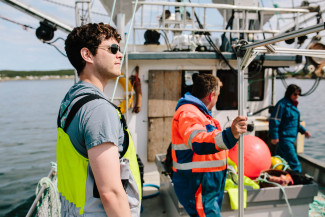
Johns Hopkins UniversityEst. 1876
America’s First Research University
Why did a fisheries scientist write a book about climate change?


I've gotten this question many times since people first heard about The Carbon Code: How You Can Become a Climate Change Hero. The answer is simple: nothing makes sense in conservation, except in light of climate change (apologies to Dobzhansky).
The consensus understanding of the climate crisis is that it is affecting everything. Oceans will get warmer and more acidic. Species will flee for the poles, and many will go extinct. Crops will fail. Rivers and lakes will vanish, and vast reserves of fossil fuels will become unburnable. Refugees will flee climate wars, and societies will shift as they accommodate – or resist – the coming wave of fleeing humans, as our planet becomes less able to support civilization.
To make matters worse, the United States now has a federal government whose leaders seem to be doing everything in their power to undermine efforts to save ourselves from the worst parts of climate change. They are eliminating environmental protections, attacking scientists, deleting data, and defunding anything that could inform us about climate change – let alone prevent it. That they are doing this despite a consensus among scientists and even most of the general public that climate change is real, dangerous, and caused by us.
It’s tempting to go on with your life and hope that they fail. But that’s not good enough anymore. Holding the right beliefs is not enough – now it’s time to act on them. And the best way to do your part is to become a climate change hero.
There are two steps to being a climate hero. First, is doing everything in your power to keep your carbon footprint as low as possible. In The Carbon Code, we look at how to do this, by tackling our consumption of electricity, our travel and transportation habits, and our daily diets. Some things, such as eliminating beef from our diets, can start right now. Others, such as investing in electric vehicles, may take a little longer. While none of these alone will solve climate change, collectively they play a part in the siege mentality we need to adopt to save the planet – and ourselves.
The second step is winning the climate conversation – using the power of your good example to build a peaceful army of climate heroes. The goal: force politicians and society’s leaders to spend our money in ways that will protect our future, ensure our security, and enable us to live healthy, wealthy lives. Many people are one good example away from becoming climate heroes themselves, so it’s your job to be the one to win them over.
Why would a fisheries guy write a book about climate change? Because I recognize that none of my work matters if we don’t fix the climate crisis. None of us can work in a vacuum anymore, and all of us need to find ways to be part of the solution. The Carbon Code gives ways to do that – and to set an example so that others do the same.
Brett Favaro is a research scientist at Memorial University of Newfoundland. He lectures widely on applying scientific approaches to creating a sustainable future for the planet. His forthcoming book, The Carbon Code: How You Can Become a Climate Change Hero, is available on Earth Day, 2017. You can connect with Dr. Favaro on Twitter @LetsFishSmarter.


